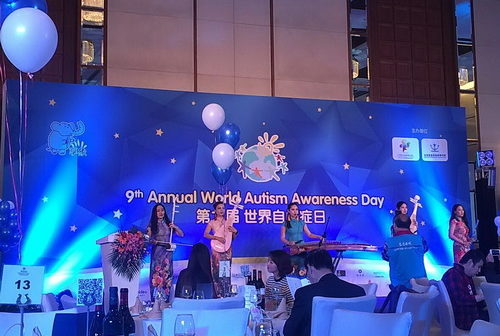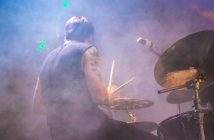On April 2, we joined Stars & Rain at their 9th annual charity gala dinner at the Hilton Capital Airport in recognition of World Autism Day. beijingkids has been a friend to the organization for many years now, and the organization has also been supported by Dulwich in the past.
Stars & Rain (Xin Xin Yu) chose the “Stars” portion of its name from the nickname, “children of stars”, used by Taiwanese to call their autistic children, and the “Rain” from Rainman (1988), the highly popular American movie. The charity runs one of the most celebrated autism rehabilitation facilities in China at their Beijing Shunyi location, housing over 300 students, but considers its primary cause parent education and public awareness. Stars & Rain also trains teachers at over 300 facilities throughout the Mainland, and now offers vocational training to autistic teens as a means to prepare them for the future.
In order to fully appreciate what Stars & Rain, founded in 1993, (and other charities with similar causes) is doing, it’s important to understand two things: 1) there is very little education on “disabilities” or “disorders” in China, so the majority of people don’t understand what autism is; and 2) the number of autistic children is growing, and will continue to grow as the new two-child policy was put in place (and children of a disabled child are now allowed to have a third child as a “replacement”).
First, let’s look at the statistics of the prevalence of autism in China:
- Approximately 1 percent of the Chinese population is autistic
- Or 10 million, of which about 2 million are children under 14 years of age (China Education Association)
- 1.1 in every 1,000 children under the age of 6 are autistic, totaling an estimated 111,000
- 77,000 children registered in rehabilitation centers nationwide
- 36,000 autistic children receive rehabilitation aid according to China’s Disabled Persons’ Federation (CDPF)
- RMB 432 million government investment in the rehabilitation for autistic children
- CDPF expects to establish a public medical aid system as the government prepares to invest more in the education and rehabilitation of autistic children
In February 2016, the Ministry of Education passed new policies pushing for the inclusion of disabled students in public education, where previously parents could only rely on private training centers and boarding schools (which tend to be more clinical, not to mention pricey). This is in line with the United Nations 2016 goal of “Autism and the 2030 Agenda: Inclusion and Neurodiversity”, with the emphasis on “mainstreaming disability” to ensure equal rights. The Beijing government has invested a substantial amount of money, offering grants of about 500,000, to over 200 schools to build special education resource classrooms, hire or train special education teachers, and train all their staff on how to accommodate students with autism.
However, inclusion hits a wall when it tries to hire trained special education teachers, for special education programs and departments are lacking in the middle kingdom. Even when such programs exist–the College of Special Education at Beijing Union University, the first of its kind in China, has been around since the year 2000–the profession is not popular. Teaching is already considered a thankless profession, but to navigate through the challenges of special needs students and individual education plans (IEPs) appears too much for most budding teachers.
The social stigma associated with autism is strong in China where the idea of honor, “face”, and shame are paramount to their communal existence. Parents of autistic children are often blamed for their child’s state, and will abandon or hide their child at home to avoid the public shame of having committed a sin (karma) or made a mistake during their pregnancy (a common belief). Educating parents on recognizing autism, what it is, and how to deal with it is Stars & Rain’s foremost concern. With such a social stigma, it’s not hard to see why Stars & Rain is also very concerned with public awareness—after all, one can build special education schools and classrooms, provide aid and scholarships, but if the parents won’t accept help out of fear of humiliation, then the children still cannot be helped.
For more information on Stars & Rain, visit their website. If you’d like to learn more about how Stars & Rain was founded, watch the Jet Li movie, Ocean Heaven (2010), which is loosely based on the lives of the founder, Tian Huiping, and her son Yang Tao, but from a father’s perspective (Jet Li).
Resources
10 Years of Progress: What We’ve Learned About Autism
10 Things People with Autism Want You to Know
Sesame Street Resources
Children of the Stars (2007) – Documentary featuring Stars & Rain
Sources: Sen Magazine, Autism Speaks, Cortical Chauvinism, China Daily, Sina.com, Echinacities.com
Photo: Courtesy of Emma Xu





2 Comments
ref.to;’The Star & Rain”program.Which; website; Should ; I use & The CE.O Ftom;England& his; non profit. Thank-you ; Raven. Ward add.23830 Newhall ave# 20 Newhall , Ca.91321 Thank -you; Taven . Ward (661)621.5591
Thanks for your comment! Looks like Stars and Rain have changed their website. This appears to be the current one:
http://www.guduzh.org.cn/english/